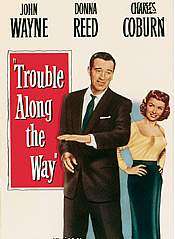Trouble Along the Way
Trouble Along the Way is a 1953 comedy film directed by Michael Curtiz and starring John Wayne and Donna Reed, with a supporting cast including Charles Coburn and Marie Windsor. The black-and-white film was released by Warner Bros. with an aspect ratio of 1.37:1.
| Trouble Along the Way | |
|---|---|
 | |
| Directed by | Michael Curtiz |
| Produced by | Melville Shavelson |
| Written by | Robert Hardy Andrews (story) Douglas Morrow (story) Jack Rose Melvill Shavelson James Edward Grant (uncredited) |
| Starring | John Wayne Donna Reed Charles Coburn |
| Music by | Max Steiner |
| Cinematography | Archie Stout |
| Edited by | Owen Marks |
| Distributed by | Warner Brothers |
Release date |
|
Running time | 110 minutes |
| Country | United States |
| Language | English |
| Box office | $2.45 million (US)[1] |
Plot
Small, obscure St. Anthony's College, a Catholic university, is in financial straits and about to be closed. To save it, and himself from forced retirement, elderly rector Father Burke (Charles Coburn) hires a down-and-out former big-time football coach, Steve Williams (John Wayne), in hopes of building a lucrative sports program. First turning down the job, Williams later accepts it when he learns that his former wife, Anne (Marie Windsor), now remarried, complained to Social Services that he is an unfit father and plans to sue for custody of his 11-year-old daughter, Carole (Sherry Jackson). Anne’s actual aim is not to get Carole, in whom she has no interest, but rather to pressure Steve into having an affair with her.
Social Services worker Alice Singleton (Donna Reed), coldly prejudiced against Steve because she suffered from a relationship with her father similar to that between Steve and Carole, is preparing a report in Anne’s favor. Steve attempts to charm Alice and win her over. Desperate to have the football program pay off, Father Burke uses his clerical connections to schedule St. Anthony's against high profile Catholic colleges — Villanova, Notre Dame, etc. — in the upcoming season. Faced with physically inadequate players, Steve uses chicanery to enroll beefy star athletes as freshmen and build a winning team. Father Burke learns of Steve’s dishonest methods, reprimands him and disbands the sports program, knowing this will cause St. Anthony’s to close. Alice submits a report unfavorable to Steve, but she repudiates it in the court custody hearing after recognizing her bias and Anne's lack of honest affection for Carole. Alice also testifies that Steve isn't a properly responsible parent, and under questioning reveals she is in love with him.
The judge halts proceedings and places Carole in custody of the State. He assigns her a new case worker until matters can be sorted out. In a surprise move, the Church agrees to continue funding St. Anthony's. Burke nevertheless resigns as rector, believing that he had been behaving selfishly to unnecessarily prolong his position. Before leaving, he reinstates Steve as coach and forgives him his unscrupulous behavior as it was done out of love for his child. The film ends with Carole, accompanied by Alice, walking away from Steve, with the implication that Steve and Alice will wed and the three would be together as a family.
Cast
- John Wayne as Steve Aloysius Williams
- Donna Reed as Alice Singleton
- Charles Coburn as Father Burke
- Tom Tully as Father Malone
- Sherry Jackson as Carole Williams
- Marie Windsor as Anne McCormick
- Tom Helmore as Harold McCormick
- Dabbs Greer as Father Mahoney
- Leif Erickson as Father Provincial
- Douglas Spencer as Procurator
- Lester Matthews as Cardinal O'Shea
- Chuck Connors as Stan Schwegler
- James Dean as Football Spectator
Production
Portions of the film were shot at Pomona College and Loyola Marymount University, and various Los Angeles high schools, including Loyola High. Max Steiner provided the music.[2]
Reception
The New York Times gave it a favorable review, citing "spirited and contemporary" dialogue.[3]
Saying that Wayne was "completely at home" in the role, Variety also found the lines, "a principal factor" in carrying the film.[2] Craig Butler found the film predictable yet heart warming.[4]
See also
References
- 'The Top Box Office Hits of 1953', Variety, January 13, 1954
- "Review: ‘Trouble Along the Way’", Variety, December 31, 1952
- "'Trouble Along Way' Follows Smooth Path at the Roxy", New York Times, May 7, 1953
- "Showtimes, reviews, trailers, news and more - MSN Movies". movies.msn.com.